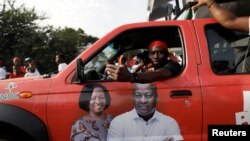Ghanaians go to the polls Monday with incumbent President Nana Akufo-Addo and former president John Mahama as front-runners. Akufo-Addo’s party has campaigned mainly on his education initiatives, while Mahama’s has focused on job creation and attacking his opponent's record on corruption. But the familiar faces have also made voter apathy an issue.
Ghana's government this week announced Monday would be a public holiday to help get voters to the polls to choose the next president.
Despite more than 17 million registered voters and 12 presidential candidates, authorities are battling voter apathy with familiar front-runners from the last two elections.
Incumbent President Nana Akufo-Addo of the New Patriotic Party (NPP) is facing off against his predecessor, John Mahama of the opposition National Democratic Congress’ (NDC).
Mahama, representing the National Democratic Congress (NDC), bested Akufo-Addo and his New Patriot Party (NPP) in 2012 but lost in 2016.
Kojo Asante, with the Ghana Center for Democratic Development, says there is voter fatigue, mainly among the middle classes.
On election day, "The first few hours is always a good indicator of whether people will eventually go out," said Asante. "If they see the crowds are behaving and then they get feedback that it is very easy to go and vote and so, then they might eventually still go out, even if they had decided not to."
Despite the challenge, Asante says the center's pre-election survey shows Ghanaians are concerned about issues such as improving infrastructure and employment.
The survey pointed to positive responses on the ruling NPP’s handling of COVID-19, power supplies and education.
But the public was less impressed with Akufo-Addo’s record on inflation, inequality and corruption.
Mahama has attacked Akufo-Addo, alleging corruption and insufficient job creation.
But risk consulting group Songhai Advisory’s Kobi Annan says both men have underperformed in office.
"It's a difficult choice for a lot of people. Neither of them have performed fantastically during their terms of office, and I think it will come down to primarily sentiments around things like education, corruption, job creation. I think job creation and education in particular - those affect more people day-to-day than corruption does," said Annan.
Under Mahama’s presidency, there was an energy crisis, corruption scandals and a currency devaluation.
In 2016, the NPP won by about 1 million votes and with high expectations for Akufo-Addo to stamp out corruption.
But in the weeks leading up to the current election, the opposition NDC made corruption allegations against Akufo-Addo. Ghana’s anti-corruption special prosecutor resigned just three weeks before the election, alleging political interference.
While Akufo-Addo denies any corruption in his administration, analysts say it’s hard to know if the claims will impact the vote.
Regardless of the result, or voter turnout, analysts are expecting Ghana’s election to be fair and peaceful – as with the last two presidential elections.
"Emotions may run high, but based on these past precedents, I believe that the election will be peaceful, and the results will be considered credible and legitimate," said Maame Gyekye-Jandoh, head of the University of Ghana's political science department.
A parliamentary by-election in January 2019 was marred by violence in Accra, with gunfire reported near a polling station and shootings that wounded people at the home of the opposition candidate, according to various reports. The king of Ga state, which includes the capital city of Accra, told VOA it was "incumbent" upon candidates, especially parliamentary candidates, "to advise their supporters to keep calm."
King Tackie Teiko Tsuru told VOA in an interview Wednesday that he expected a free and fair election. "We are a God-fearing people, and it is up to us to keep the faith and keep calm," he said.
After voters cast their ballots, "they should leave the rest of the job to the electoral commission and the security agencies."
The University of Ghana published a voter survey that gave the NPP an estimated 11% lead over the NDC with 5% of voters undecided.
Peter Clottey of VOA's English to Africa Service contributed to this report from Accra.









